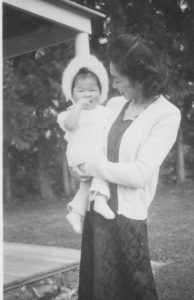 Contributed by special guest author/writer/lecturer, Linda Tamura
Contributed by special guest author/writer/lecturer, Linda Tamura
Gifts from my mom have recently emerged in surprising ways and at unexpected times.
Cooking more frequently now while quarantined, I’m reminded when I flick on the rice cooker how Mom painstakingly steamed rice in a foaming pot on the stove, keeping an eye on the temperature and time – and chiding herself when pearls of rice emerged a bit scorched. How did she manage to cook rice the “old fashioned way” while juggling her other chores?
When I harangue officials appearing on TV news after they spout put-downs and falsehoods, I hear her voice reminding me, “Now, now, don’t say anything you’ll regret later.” How did Mom keep her cool even when she recognized outright wrongs?
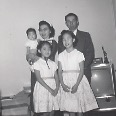 While downsizing and rearranging our home, I’ve taken a second look at remembrances from Mom. And I wonder: How did she balance nine-hour work days hoeing trees or thinning pears with Dad in our orchard or hammering boards into boxes (even with a big bandage from misjudging her finger placement) with cooking, cleaning, doing laundry with a wring-washer and clothes-line while still managing to raise three daughters? And how did she find time to crochet delicate doilies and tablecloths, embroider pillowcases, sew dresses and outfits for all of us – and then find joy in gardening, too? How did she manage to multitask before that concept even became vogue?
While downsizing and rearranging our home, I’ve taken a second look at remembrances from Mom. And I wonder: How did she balance nine-hour work days hoeing trees or thinning pears with Dad in our orchard or hammering boards into boxes (even with a big bandage from misjudging her finger placement) with cooking, cleaning, doing laundry with a wring-washer and clothes-line while still managing to raise three daughters? And how did she find time to crochet delicate doilies and tablecloths, embroider pillowcases, sew dresses and outfits for all of us – and then find joy in gardening, too? How did she manage to multitask before that concept even became vogue?
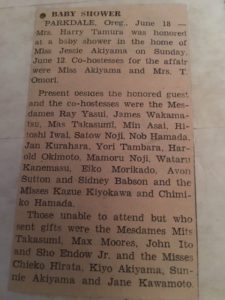 I recently found the baby book that Mom lovingly compiled 70 years ago. Tucked inside the cover in a plain envelope were two yellowed Hood River News articles. The first, labeled June 18, Parkdale, Oregon, had a simple title: “Baby shower.” It detailed an event hosted by “Miss Jessie Akiyama” three days before I was born. Not only did it list the 17 “mesdames” (listed by their spouses’ names) who attended, but it included the eight who sent gifts but were unable to attend. Notably among the guests were the spouses of two Euro-American men who’d been supportive of my grandparents’ family both before and after the war, despite a caustic community campaign to prevent the return of Japanese Americans after their wartime incarceration. This was a ruthless drive supported by “No Japs Wanted” ads signed by more than 1,800 locals that brought national notoriety to my hometown. So, in a way, after the scourge of wartime exclusion and the fear about how they’d be accepted in their own community, this article represented more than just a celebration of life, albeit mine. It was also an exemplar of friendships and reunions that crossed racist borders, maybe even an oblique call for unity. Could it be that Mom is speaking into my ear again, this time urging our efforts toward the equity and balance that were amiss when she was growing up – and that challenge us in new ways today?
I recently found the baby book that Mom lovingly compiled 70 years ago. Tucked inside the cover in a plain envelope were two yellowed Hood River News articles. The first, labeled June 18, Parkdale, Oregon, had a simple title: “Baby shower.” It detailed an event hosted by “Miss Jessie Akiyama” three days before I was born. Not only did it list the 17 “mesdames” (listed by their spouses’ names) who attended, but it included the eight who sent gifts but were unable to attend. Notably among the guests were the spouses of two Euro-American men who’d been supportive of my grandparents’ family both before and after the war, despite a caustic community campaign to prevent the return of Japanese Americans after their wartime incarceration. This was a ruthless drive supported by “No Japs Wanted” ads signed by more than 1,800 locals that brought national notoriety to my hometown. So, in a way, after the scourge of wartime exclusion and the fear about how they’d be accepted in their own community, this article represented more than just a celebration of life, albeit mine. It was also an exemplar of friendships and reunions that crossed racist borders, maybe even an oblique call for unity. Could it be that Mom is speaking into my ear again, this time urging our efforts toward the equity and balance that were amiss when she was growing up – and that challenge us in new ways today?
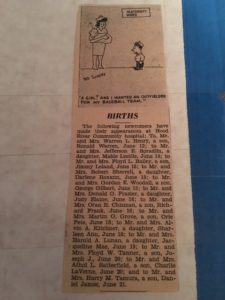 Oh, and the second article I found? A short clip entitled “Births” listed newborns for the previous week. Mine was the last of thirteen entries, announcing the birth “to Mr. and Mrs. Harry M. Tamura, a son, Daniel James, June 21.” Now my sisters tease me that they had always wanted a big brother …
Oh, and the second article I found? A short clip entitled “Births” listed newborns for the previous week. Mine was the last of thirteen entries, announcing the birth “to Mr. and Mrs. Harry M. Tamura, a son, Daniel James, June 21.” Now my sisters tease me that they had always wanted a big brother …
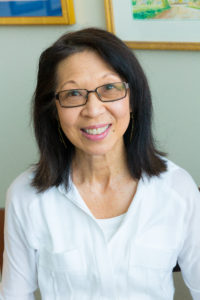 Bio: Linda Tamura is a third-generation Japanese American, an orchard kid raised in Hood River, Oregon and the daughter of a World War II veteran. A Professor Emerita of Education at Willamette University, she is the author of two books on Japanese Americans: Nisei Soldiers Break Their Silence: Coming Home to Hood River and The Hood River Issei: An Oral History of Japanese Settlers in Oregon’s Hood River Valley. Linda is a co-editor-in-chief of The Oregon Encyclopedia (www.oregonencyclopedia.org) and is involved in other projects and programs, including the upcoming exhibit on Japanese American women for the Japanese American Museum of Oregon (JAMO).
Bio: Linda Tamura is a third-generation Japanese American, an orchard kid raised in Hood River, Oregon and the daughter of a World War II veteran. A Professor Emerita of Education at Willamette University, she is the author of two books on Japanese Americans: Nisei Soldiers Break Their Silence: Coming Home to Hood River and The Hood River Issei: An Oral History of Japanese Settlers in Oregon’s Hood River Valley. Linda is a co-editor-in-chief of The Oregon Encyclopedia (www.oregonencyclopedia.org) and is involved in other projects and programs, including the upcoming exhibit on Japanese American women for the Japanese American Museum of Oregon (JAMO).
